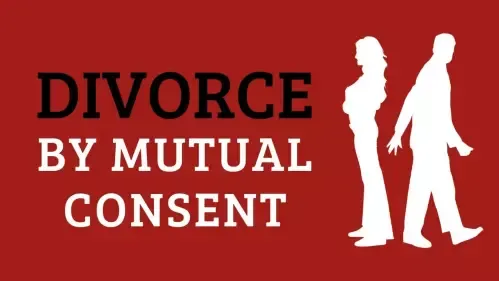Moreover, it is easy to file for mutual divorce. The division of sev per se is provided for by section 13B of the Hindu Marriage Act, 1955, which has certain conditions that must be met by both the parties by splitting the party.
For example, if the husband and wife have been living for a period of one year or more and they are not living together, and both of them mutually agree that the marriage is solemnized, then They can get divorced.
Research says that divorce through mutual consent is one of the fastest ways in India, as other options have been around for a very long time. The law states that all marriages solemnized before or after the Marriage Laws (Amendment) Act 1976, if annulled, can be annulled on the appearance of consent before the court.
The need for compliance with the following requirements for a mutual divorce:
- Both the parties are staying for a period of one year. It is suspected that it was done by the law makers that the parties parted by mutual consent or circumstances. But the court may not necessarily go into that matter, irrespective of whether the matrimonial couple is satisfied in the case of different living or different residences under the same roof of the House. Unless the consent of either party to such a petition is deviating from obstruction, fraud or undue influence, the court shall not go beyond the legal position of its jurisdiction.
- Both sides have failed to stay for whatever reason. In other words, no reconciliation or adjustment is possible between them.
- The parties have freely agreed to the dissolution of the marriage.
- The parties are at liberty to take up the petition. It appears that the petition may be withdrawn on the request of either side during six months from the date on which it is granted. But when violence and the Bill will be punished after the ceremony until the end of the six months of presentations by the parties, which will be punished by the ability to repeat the unit's absence of sanctions.
Mutual divorce process
- Mutual consent is the presence of two courts in divorce proceedings. A joint petition signed by both the parties has been filed in the concerned court. In divorce petition, joint statement includes joint statement that because of their innocent differences, they cannot live together and they should get divorced. This statement includes partition properties, custody of children etc., which are in motion first, the statements of both the parties are registered and then the paper is signed in the form of Hon'ble Court. Thereafter, there is a period of 6 months for conciliation, (The Hon'ble Court is given an opportunity to change its mind).
- 6 months after the first resolution or by the end of the conciliation period, if both the parties still do not agree to come together, the parties may appear for the second motion for final hearing.
- The party to the second motion may appear at the last hearing for the first motion 6 months or until the end of the conciliation period, if both parties do not agree to come together.
- If the second motion is not brought within a period of 18 months, the court will not pass the order for divorce. Further, with the language of the section, as with the permanent law, it is clear that one side can withdraw your consent at any time before the order is passed.
- The most important requirement for the division of the crowd for mutual consent is the free management of both the parties. In other words, unless there is a perfect agreement between the husband and the wife for the dissolution of the marriage and unless the court is completely satisfied, it cannot order a marquette agreement for divorce. In the final stage, a divorce is ordered if the divorce court is correct.
Benefits of Mutual divorce
Divorce by mutual consent eliminates unnecessary quarrels and saves a long time and monetary resources. With the increasing number of applications for divorce, mutual consent divorce is the best option.
Where to enter a divorce case?
The parties are required to enter into a divorce in the family court of the city where both partners were last, that is, at their marital home.Can the mutual divorce order be achieved through notary?
No mutual divorce can be given through a notary in India. A valid order of divorce can be given only by a family court of appropriate jurisdiction.







If you liked the information of this article, then please share your experience by commenting. This is very helpful for us and other readers. Thank you